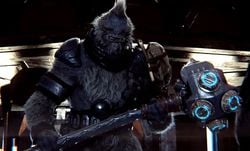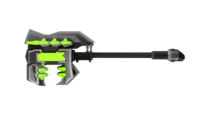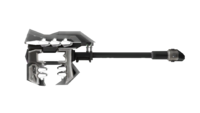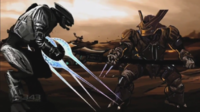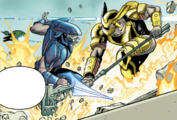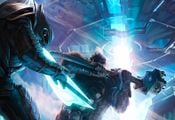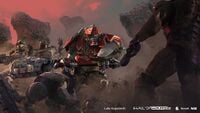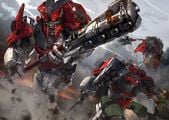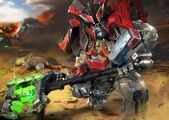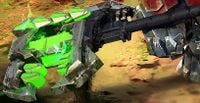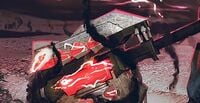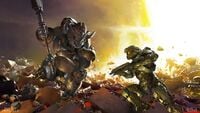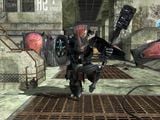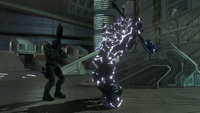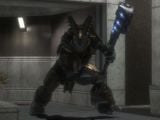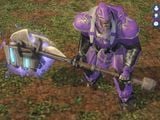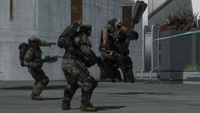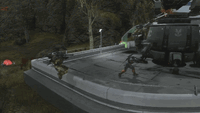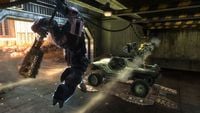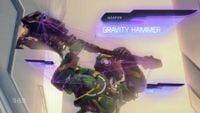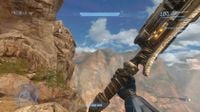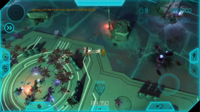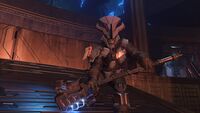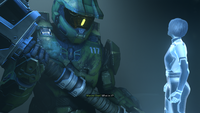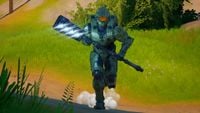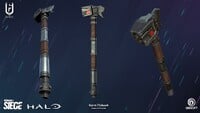Gravity hammer
From Halopedia, the Halo wiki
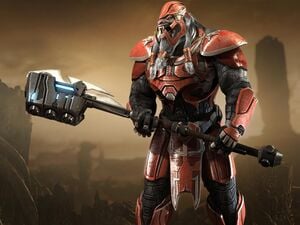
| “ | The Gravity Hammer is a Brute melee weapon that combines a bladed war hammer with repurposed gravitic impellers integrated onto the striking face. These impellers give the weapon its namesake, and each smash produces a devastating area-of-effect pulse.[1] | ” |
Gravity hammers are a class of two-handed melee weapons developed by the Covenant and inherited by its splinter factions. To their users, the Jiralhanae, they are formally designated as war hammers.[2][3] The Office of Naval Intelligence has typically type-classified encountered gravity hammer variants under the designation of the Type-2 Energy Weapon/Hammer (T-2 EW/H).[4][5] Nicknames for the gravity hammer include the Hammer and the Club.[6]
Overview[edit]
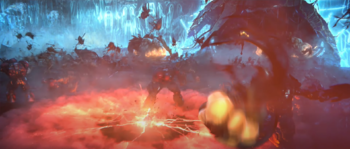
Design details[edit]
- "One hit from that hammer and you ended up a puddle of bones and blood."
- — Private Aaron Landvik[7]
A gravity hammer typically consists of a two-meter long haft,[5] a hammerhead, and a tungsten-alloy blade on the reverse side of the head.[4][8] A counterweight is attached to the bottom end of the haft.[9] A short-range, shock-field-generating gravitational energy drive is integrated inside the head of the hammer,[6][10] while the head's striking face is lined with repurposed Covenant gravitic impellers,[2] which release a concussive force upon impact.[3] Together, the devices allows the wielder to briefly displaces local gravity at the point of the hammer's impact with impressive knockback,[2][11] while producing an area-of-effect kinetic pulse (of approximately 4.5 meters).[4] The gravitational energy drive's effects allows the user to displace objects of greater weight or power than what a normal blow might do.[6] The gravity drive can also manipulate localized energy fields,[9] granting the user the ability to pull a target towards themselves or push the target away.[12][13][14] However, the Jiralhanae's brutal nature, along with the increased damage from the impellers,[10] means that they often prefer to use the weapon in melee combat.[5] Although humans first encountered the weapon in 2526,[15] the exact mechanism by which the gravity hammer functions was still under investigation by United Nations Space Command in 2552.[4]
History[edit]
The gravity hammer evolved from traditional Jiralhanae-bladed war hammers,[2] dating back to the war-totems wielded by war chieftains on Doisac.[3][15] Within the Jiralhanae's barbaric culture, in addition to being a powerful weapon, the war hammers serve as the ultimate symbol of clan leadership,[8][5] taking on an almost religious significance among the Jiralhanae.[6] The ceremonial hammer of a pack or a clan is only passed to another Jiralhanae if he can best his chieftain in ceremonial combat; the mantle of leadership passes along with the weapon.[5]
Following the Jiralhanae's absorption into the Covenant hegemony in 2492,[5] the war hammers were modified with Forerunner technology reverse-engineered by the Covenant.[2][3][11] The first gravity hammer and the template for the standardized weapons of this type was the Fist of Rukt, an ancestral war hammer of Maccabeus' clan which was upgraded with Covenant gravity technology after Tartarus was appointed the Chieftain of the Jiralhanae in the Covenant.[16] After Tartarus was granted the Fist of Rukt, many minor chieftains commissioned similar weapons, with components of the ancestral hammers incorporated when possible.[15] Over the course of the Human-Covenant War, a variety of hammer variants were produced in workshops and war forges, sporting performance upgrades and individual stylistic tweaks.[2] The gravity hammers inherited the war hammers' totemistic and ceremonial significance,[8] with wielders being expected to treat their gravity hammer with great care.[17] Furthermore, some hammer have been aesthetically-tailored to the use of specific clans, families, or packs,[5] resulting in numerous variants. During his rise to power within the Covenant, Tartarus used his relationship with the San'Shyuum to reward loyal lieutenants with similarly-advanced hammers secretly forged within the Sacred Promissory.[18]
In 2552, only a few months before the Great Schism and the fall of High Charity, the Sacred Promissory began producing gravity hammers en masse,[8] likely as a part of the Prophet of Truth's order to expand the Sacred Promissory's scope to the production of all Jiralhanae matériel for the impending purge of the Sangheili.[19] Following the dissolution of the Covenant, the Banished seized the design templates for nearly all Covenant gravity hammer variants. The Banished contracted war-forges to reproduce and modify existing designs or create new variants, with the number of variants being employed reaching upwards of 50.[3]
Usage[edit]
- Avery Johnson: "Heavy pistols, and a hammer."
- Ponder: "Say again?"
- Avery Johnson: "A giant hammer, sir. On their leader."
- — Avery Johnson describing Maccabeus with the Fist of Rukt, to Ponder[20]
The gravity hammer serves dual purposes as a weapon as well as a defining ceremonial vestige of clan leadership, and is thus typically wielded by a chieftain or other high-ranking members.[5] Within the Covenant, the gravity hammers were commonly wielded by Chieftains.[21][22][23] Atriox, being a Bloodstar in the Covenant and no implication that he was a Chieftain, is seen using a gravity hammer implying that Jiralhanae Bloodstars in the Covenant were allowed Gravity Hammers.[24][25] Within the Banished, the gravity hammer was a much more common sight,[26][27] notably being used by Jiralhanae Warlords and Jiralhanae Jumpers.[28] The variants with most widespread use among the Banished includes the Sepulo'tez, Halbashi, and Akelas variants.[3]
A gravity hammer is also integrated into the barrel of the Mutilator shotgun for use in a manner similar to a bayonet, allowing the operator additional close-ranged combat options.
Variants[edit]
During the Jiralhanae's alliance within the Covenant, numerous designs of gravity hammers were developed.[2]
- Akelas Workshop gravity hammer: A variant used by the Covenant and the Banished, with a notable wielder being Chieftain Avitus.[3]
- Akelus Workshop gravity hammer: A variant used by Jiralhanae Chieftains in the Covenant during the Battle for Earth and the Battle of Installation 00.[2]
- Eektah-fel siphon hammer: A variant used by some Banished Jiralhanae Warlords.[29][30]
- Voridus' infused hammer: A variant which leaves pools of infusion gel on impact. Only wielded by Voridus.[31][32]
- Halbashi Workshop gravity hammer: A variant of the gravity hammer used by the Banished during the Battle for Zeta Halo.[33][2]
- Rushdown Hammer: A variant that contains an upgraded gravitic core that increases its effective range, made of composite materials that allow users to be more mobile.[1] One notable wielder being En'Geddon during the Battle for Zeta Halo.[33]
- Paegaas Workshop gravity hammer: A variant used by the Jiralhanae in the Covenant during the Fall of Reach,[3] then Banished Jiralhanae Warlords and Jiralhanae Jumpers during the Second Ark Conflict.[34] Models recovered from the field were used by Spartan-IVs in War Games simulations.[10][35]
- Sepulo'tez Workshop gravity hammer: A variant used by the Banished, but also by Spartan-IVs in War Games simulations.[2]
- Corpsemaker: An improved variant with faster swing time and additional energy capacity, made from the finest materials its creator could coerce or steal from raider lairs on Warial and Teash.[36]
- Grinder: An improved variant with uncalibrated impellors that generate an unstable gravimetric vortex EMP at the point of impact.[36]
- Tartarus' Gavel: One of the many advanced variants secretly forged from the Sacred Promissory, with its creation tracing back to Tartarus, who used his relationship with the Prophets during his ascent to power within the Covenant to reward loyal lieutenants with advanced weaponry.[36]
In-game information[edit]

|
See our gameplay information related to Gravity hammer on its gameplay page. |
- Main article: Gravity hammer
The gravity hammers were introduced into the Halo first-person shooter games with the debut of the Fist of Rukt in 2004's Halo 2, albeit unusable by players. Gravity hammers were then made usable by players in Halo 3 as a second melee weapon after the energy sword, and has become a mainstay weapon in series ever since. The gravity hammer is a powerful melee weapon that can kill multiple foes in one swing, and can even be effectively used against vehicles. They are power weapons which appear on some multiplayer maps.
Trivia[edit]
- The gravity hammer is used in the popular playlist Grifball, in which the players have no shields and must somehow take their bomb and get it to the other team's base. The hammer is often used to create enough force to propel the bomb-carrying player over the heads of their opponents and into the goal.
- In Halo 3 and Halo: Reach, there is a remodeled version of the gravity hammer called "7 wood". The 7 wood performs exactly the same gameplay wise, except it is modeled to look like a giant golf club and features a different reticule.
- In Halo 4 and Halo 5: Guardians, if the player is hit with a gravity hammer but does not die, the player will hear an ear ringing sound effect usually heard when they are hit with explosives in the campaign.
Gallery[edit]

|
Browse more images in this article's gallery page. |
Concept art and illustrations[edit]
A Jiralhanae Captain Major with an Akelus Workshop gravity hammer in The Return.
A Jiralhanae Captain Major with a gravity hammer in Halo: Escalation.
Tartarus with the Fist of Rukt from Halo Legendary Crate.
Halo Infinite concept art of a Jiralhanae swinging a gravity hammer at John-117.
Halo Infinite concept art of a Jiralhanae fighting Armiger Soldiers with the gravity hammer.
Screenshots[edit]
A chieftain wielding an Akelus Workshop gravity hammer in Halo 3.
Cethegus with an Akelus Workshop gravity hammer in Halo 3.
A War Chieftain wielding an Akelus Workshop gravity hammer in Halo 3: ODST.
A chieftain with a Paegaas Workshop gravity hammer charging at two UNSC Army troopers in Halo: Reach.
A Brute amazingly killed two Spartans in Halo: Reach.
A Spartan-IV wielding the Paegaas Workshop gravity hammer in Halo 4.
The Paegaas Workshop gravity hammer in Halo Online.
A Chieftain swinging a gravity hammer at Spartan Davis in Halo: Spartan Assault.
A Flood gaunt form pulling on an Akelas Workshop gravity hammer away from a Jiralhanae in Halo Wars 2.
John-117 running with a Halbashi Workshop gravity hammer in Fortnite.
The "Gravity sledgehammer" in Rainbow Six: Siege.
List of appearances[edit]
Sources[edit]
- ^ a b Halo Infinite, Forge - Gravity Hammer description: "The Gravity Hammer is a Brute melee weapon that combines a bladed war hammer with repurposed gravitic impellers integrated onto the striking face. These impellers give the weapon its namesake, and each smash produces a devastating area-of-effect pulse."
- ^ a b c d e f g h i j Halo Encyclopedia (2022 edition), page 307
- ^ a b c d e f g h Halo Encyclopedia (2022 edition), page 484
- ^ a b c d Bungie.net, Halo: Reach Ordnance Page (Retrieved on Feb 21, 2021) [archive]
- ^ a b c d e f g h Halo Waypoint, Gravity Hammer (Retrieved on Mar 14, 2011) [local archive] [external archive]
- ^ a b c d Halo Encyclopedia (2011 edition), page 348
- ^ Halo: Spartan Assault, Pre-mission quotes
- ^ a b c d Halo: The Essential Visual Guide, page 82
- ^ a b Halo 4: The Essential Visual Guide, page 93
- ^ a b c Halo Waypoint, Halo 4 Interactive Guide - Covenant Weapons (Retrieved on Mar 27, 2014) [local archive] [external archive]
- ^ a b Halo Waypoint, Halo 5: Guardians - Hammer Storm - Gravity hammer (Retrieved on Sep 22, 2021) [archive]
- ^ Halo 2, campaign level The Oracle
- ^ Halo 2, campaign level Quarantine Zone
- ^ Halo 2, campaign level The Great Journey
- ^ a b c Halo Waypoint, Universe - Weapons - Gravity Hammer (Retrieved on Apr 16, 2021) [archive]
- ^ Halo Waypoint, Universe - Weapons - Fist of Rukt (Retrieved on Sep 18, 2021) [archive]
- ^ Halo: Contact Harvest, chapter 15: "This was the Fist of Rukt, an ancient weapon passed down from one Chieftain to the next for generations of Maccabeus'clan. It deserved greater care."
- ^ Halo Waypoint, Canon Fodder - Close Quarters (Retrieved on Oct 17, 2021) [archive]
- ^ Halo: The Essential Visual Guide, page 128
- ^ Halo: Contact Harvest, page 245
- ^ Halo 3, Gameplay
- ^ Halo 3: ODST, Gameplay
- ^ Halo: Reach, Gameplay
- ^ Halo Wars 2, campaign level A New Enemy
- ^ Halo: Rise of Atriox, issue 1
- ^ Halo Wars 2, campaign level The Signal
- ^ Halo Wars 2 - Awakening the Nightmare, campaign level What Could Go Wrong?
- ^ Halo Wars 2, Gameplay
- ^ Halo Wars 2, Phoenix Logs - Warlord
- ^ Halo Waypoint, Canon Fodder - The Art of War(s) (Retrieved on Jan 23, 2021) [archive]
- ^ Halo Wars 2, Voridus in-game unit
- ^ Halo Wars 2, Phoenix Logs - Voridus: "Though he takes to the field with a standard gravity hammer, once he acquires enough resources he replaces it with an Infused Hammer, which creates energy pools with each strike and synergizes with his armor."
- ^ a b Halo Infinite, Gameplay
- ^ Halo Wars 2, In-game model
- ^ Halo 4, Gameplay
- ^ a b c Halo Waypoint, Canon Fodder - No Joke (Retrieved on Nov 13, 2020) [archive]
| ||||||||||||||
|
| |||||||||||
